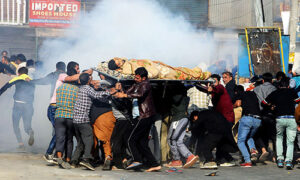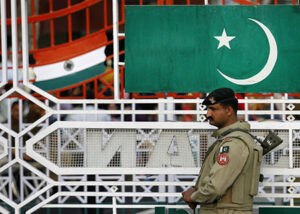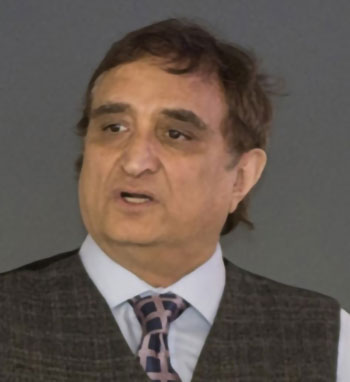Currently there is lot of ongoing talk about backdoor negotiations between the two adversaries Pakistan and India, apparently facilitated by a Middle Eastern country, the UAE. But there is clearly more going on than what meets the eye. A miniscule nation like the UAE has limited clout in relation to persuading two nuclear powers to participate in a peaceful dialogue. Most likely it was some backdoor manoeuvring conducted by a major superpower that broke the ice between these nations, and they were coaxed to at least interact with each other.
Under normal circumstances, as a resident of IOK (Indian-occupied Kashmir) who has been witness to the protracted suffering of the population there, I should relish a thaw in relations between the two countries. It might after all, offer a chance for parleys between the two countries to help establish the groundwork needed for the resolution of the tangled problem of IOK. Unfortunately, that is not the case, and like the majority of the Kashmiri diaspora, I am deeply anguished by the news of this interaction and the information that several meetings have already taken place in Dubai, London and Bangkok. Notwithstanding that the authenticity of these news items cannot be indisputably established, if true, it can be safely stated that Pakistan once again is being taken for a ride. Although there is very little information about the agenda included in these talks, they are doomed even before they have begun — which will be calamitous for the cause of Kashmir.

Let me discuss the rationale for the inference that this interaction will be nothing but unmitigated disaster, at least unless initial spadework is undertaken.
To put it in very simplistic terms, one fails to understand what is so unique about these negotiations. Similar bilateral summits between the two nations, with failed outcomes, have been held on previous occasions, and by all accounts, the current one is not a departure from the past. The primary reason for these unabated failures is the lack of sincerity and seriousness on the Indian side. India has been disingenuous with regard to Kashmir in the past, and that attitude has not undergone any radical change. Any individual thinking otherwise is living in an illusionary world.
As any keen observer of Indo-Pak talks in the past decade will tell you, if you delve a little deeper into the issue, a pattern emerges. Talks are initiated at the stage of mid-level officials on either side, with the promise that they will be upgraded in the near future. This is followed by bomb blasts or so called terrorist attacks on Indian soil (Mumbai, Pathankot, Pulwama). Highly efficient Indian agencies who are unable to prevent these attacks lose no time in blaming Pakistan or ISI and claiming that they have incontrovertible evidence of their involvement. Pakistan is put on the defensive and their repeated pleas for access to the evidence collected by India is denied. Instead India has the chutzpah to dictate to Pakistan and there is a clamour that the so-called “suspects” be handed over to them. As expected, Pakistan refuses to do so and there is a cessation of parleys for a long time. There is no reason to believe that India will not continue to pursue this strategy of one step forward, two back.
It does not take any in-depth analysis to reach the conclusion that this dilly dally process adopted by India is part of their game plan. The country is aggressively pursuing the policy of strengthening its grip on IOK.
This involves:
a) Introducing fresh draconian laws on a daily basis to further subjugate the people of IOK.
b) Bringing into IOK Hindu officials from India who will cooperate in executing their designs. And most important,
c) Ensuring that demographic changes are accomplished so that IOK is transformed from a Muslim-majority to a Muslim-minority state.

As alluded to earlier, the mistrust between India and Pakistan is so deep that bilateralism will never work. It has failed to yield tangible results in the past and it is puerile to think that the future will be any different. Let us refer to the most important bilateral agreement called the ‘Shimla Accord’ between the two countries which was signed in 1972, post the Bangladesh war. Very often, when it comes to the Kashmir issue, India emphatically states that the talks need to be held under the purview of this agreement. In this regard, it needs to be conveyed that the accord never took off the ground. Let us name any one or two clauses in the agreement which were fulfilled. Needless to say that the accord was a non-starter and should be disposed of in the dustbin of history. Moreover, the point which needs to be emphasised is that the accord was signed between victor (India) and vanquished (Pakistan). The then Prime Minister of Pakistan, Zulfiqar Ali Bhutto was under duress to get 90,000 Prisoners Of War and occupied territory back from India. Whether he had the mandate to bargain on the Kashmir issue is questionable. The promise for the right of self-determination was given to the people of IOK by the world body called the United Nations. Neither India nor Pakistan have jurisdiction or locus standi to compromise on this issue and any agreement made without the participation of the genuine or bonafide leadership of the Kashmiri people should be considered null and void. In short, the Kashmir issue cannot be used as a bargaining chip between the two countries for other unresolved matters.
Having stated some of the points which outline the futility of current Indo-Pak negotiations, one needs to also examine the recent faux pas by Pakistan which harmed the Kashmir cause and call for important damage control.
It is very disappointing to observe that in response to the changed scenario after August 5, 2019, the Pakistan Foreign Ministry has not re-evaluated their strategy with regard to Kashmir. One would expect that the Foreign Minister of Pakistan would plead the case of Kashmiris at important world capitals rather than in gatherings held in Multan or other cities of Pakistan. One fails to understand if there is some strategy vis-à-vis the current developments in IOK. It is of utmost importance that experts on this topic, including diplomats, politicians and clued-in journalists are approached and both long-term and short-term strategies are evolved to address this issue. Obviously the blueprint (if there was one) of the past has failed and novel and innovative ideas need to be entertained. Overall, a new course of action that refurbishes, reinvents and reinvigorates the Kashmir policy needs to be adopted.
The Pakistan army is the most respectable institution in the country and needs to be held in high esteem. It needs to be admitted that the army has all along been highly supportive and a source of inspiration for the freedom struggle of the people of IOK. However, the recent statement by the army chief that “India and Pakistan should bury the past” is a letdown for the people of IOK. It should be emphatically impressed upon General Bajwa that the fact that more than 130,000 innocent Kashmiri people have been martyred by occupation forces cannot be discounted. More than 15,000 Kashmiri women ranging from 8-80 years of age have been gang-raped by the Indian army and that cannot be forgotten. The presence of thousands of mass graves and missing Kashmiris in the region cannot be ignored. That thousands of children as young as 13 years have been blinded by pellet gun wounds should not go unnoticed. And about 20,000 Kashmiri youth languishing till now in Indian jails under sub-human conditions should not be forgotten.
General Sahib, it would be a injustice of monumental magnitude to dismiss these barbarous acts, which are a shame for all humanity. Notwithstanding the internal or external compulsions, the people of IOK expect that the leadership of the Pakistan army will play a proactive role in impressing upon the political leadership to pursue these acts of savagery in the International Court of Justice.
Although unrelated, this is reminiscent of a past incident during which the Prime Minister of Pakistan on a visit to India snubbed the Hurriyat leadership, but had time to participate in a luncheon ceremony organised by a steel magnate of that country. Let it be reiterated that the people of IOK look upon the Pakistani people in general and the army in particular as their ultimate saviours who will rescue them from the clutches of the Indian hell-hound. The sensitivities and sensibilities of the Kashmiri nation should receive top priority before the Pakistan army chief makes statements or participates in any activity.

The recent hoopla in the Pakistani news channels about Modi’s letter to Prime Minister Imran Khan on the country’s “national day” was upsetting. Needless to say that this kind of attitude is playing to the Indian agenda. To construe this very minor step as a “new beginning” is a juvenile approach and needs to be avoided. This gesture is a part of Indian machinations, its wilful agenda to deviate world attention from the Kashmir issue and the atrocities they are inflicting on the population. The picture India wants to portray to the international community is that the impasse has been overcome, channels of communication with Pakistan have been opened, and in future things will be hunky-dory. Under no circumstances should Pakistan get swayed with the optics as far as the relationship with India is concerned.
In one of his statements, a well-known Pakistani politician called Modi’s letter a “window of opportunity.” As a Kashmiri I see no window, rather an opaque wall which needs to be dismantled with courage and conviction so that the people of IOK can see the sunlight and breathe fresh air.
In short then, the recent Indian gestures can be construed as a trap laid by India — traps which they have mastered — and Pakistan should be smart enough not to take the bait. Pakistan needs to stop licking the wounds of the 1971 war. That was a highly unfortunate incident for the Muslims of the subcontinent, but the current situation presents a different scenario. By indulging in unabated jingoism and sabre-rattling, India is testing the nerves of Pakistan. Pakistan needs to shed its obsequious attitude towards India and stop getting on the defensive. Although India tries to act as a superpower, taking current realities into account, that can be interpreted as a pipe dream. It is laughable to compare India with China who has emerged as an economic giant and poses an existential threat for the United States as a superpower. In short, the Indian economy is in total disarray, and with China breathing down its neck, it is highly unlikely that it will indulge in any military adventurism against Pakistan. Pakistan needs to be firm and unwavering in its stand on Kashmir and unequivocally refuse to yield to any kind of pressure.
I will not make exhaustive suggestions about the steps that Pakistan needs to take to counter the onslaught of Indian propaganda. Unfortunately, the well-oiled Indian machinery has, to a large extent, been successful in distorting the image of Pakistan. India has recruited several agencies in Europe and America and presented the Kashmir issue as an outcome of terrorist activities perpetrated at the behest of Pakistan. Meanwhile, the Kashmir issue is screaming and pleading for the launch of a media campaign to spread the voice of innocent Kashmiris who are being subjected to the kind of atrocities never witnessed before. Some of the following steps may prove to be helpful:
One doesn’t get glimpse of the suffering or the struggle of the Kashmiri people on the streets of Pakistan. There are no billboards or giant posters depicting the Indian atrocities and subjugation of the Kashmiri population. The structures depicting these should be installed just outside the major airports and as soon as a tourist enters the city it should gain his/her attention and the person should develop a curiosity about the issue. The billboards and posters should be present in front of major landmark buildings and tourist spots.
The Indian film industry has produced at least five-six feature films on the Kashmir issue in which it was presented as a consequence of Pakistan-sponsored terrorist activities. To my immense delight the movies totally bombed — a portrayal of buffoonery rather than historical facts. It is my suggestion that the Ministry of Information and Broadcasting with the guidance of the Ministry of Foreign affairs, should seriously consider producing a feature film on real-life incidents that illustrate the Indian atrocities in IOK. Mass rapes in the village of Kunan-Pushpora could be an excellent topic for the film. A versatile director like Shoaib Mansoor (who created movies like Khuda ke Liye, Bol etc) would be an excellent choice. There is substantial information on this gory incident and writing a script will not be a painstaking effort. The movie may not be a “magnum opus,” but experienced foreign technicians should be recruited to illustrate the chilling effect of this macabre event. If handled deftly, the movie may find space in International film festivals and the Kashmir cause could get world attention never witnessed before.
The Ministry of Information and Broadcasting along with the Kashmir Committee should hold a yearly art and news exhibition depicting the sufferings, miseries and enslavement of the IOK population. The event should be highly publicised and serious efforts should be made to ensure the presence of foreign diplomats and the international press. The event should be judged and prizes distributed for the top presentations.

The writer hails from Indian Occupied Kashmir and teaches at The George Washington University.



